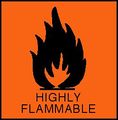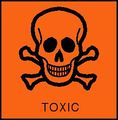Difference between revisions of "MSDS - Methanol"
| (4 intermediate revisions by the same user not shown) | |||
| Line 1: | Line 1: | ||
| − | + | <gallery widths="120px" heights="120px" perrow="2" align="left"> | |
| + | File:Symbol - highly flam.jpg | ||
| + | File:Symbol - toxic.jpg | ||
| + | </gallery> | ||
| + | |||
| + | |||
<br> | <br> | ||
| Line 7: | Line 12: | ||
<br> | <br> | ||
<br> | <br> | ||
| + | <br> | ||
| + | <br> | ||
| + | |||
| + | Methanol material data safety sheet. Reproduced with kind permission of the Department of Chemistry, Oxford University. | ||
| + | |||
| + | Last updated January 8, 2004 | ||
| + | |||
| − | <table border="2" bordercolor="#AAAAAA" style="background-color: #F9F9F9" width=" | + | <table border="2" bordercolor="#AAAAAA" style="background-color: #F9F9F9" width="900" cellpadding="3" cellspacing="0" bgcolor="#FFFFFF"> |
<tr> | <tr> | ||
<td>Common synonyms</td> | <td>Common synonyms</td> | ||
| − | <td>Methyl alcohol | + | <td> |
| + | *Methyl alcohol | ||
| + | *Wood alcohol | ||
| + | *Meths</td> | ||
</tr> | </tr> | ||
<tr> | <tr> | ||
<td>Formula</td> | <td>Formula</td> | ||
| − | <td> | + | <td>CH<sub>3</sub>OH |
| + | </td> | ||
</tr> | </tr> | ||
<tr> | <tr> | ||
<td>Properties</td> | <td>Properties</td> | ||
| − | <td>Form: colourless liquid with a characteristic smell | + | <td> |
| − | Stability: Stable, but very flammable | + | *Form: colourless liquid with a characteristic smell. |
| + | *Stability: Stable, but very flammable. | ||
| − | Melting point: - | + | *Melting point: -98°C. |
| − | Boiling point: 64. | + | *Boiling point: 64.7°C. |
| − | [http://ptcl.chem.ox.ac.uk/MSDS/glossary/flashpoint.htm Flash point]: 11°C | + | *[http://ptcl.chem.ox.ac.uk/MSDS/glossary/flashpoint.htm Flash point]: 11°C. |
| − | Explosion limits 6% - 36% | + | *Explosion limits 6% - 36%. |
| − | Water solubility: miscible in all proportions | + | *Water solubility: miscible in all proportions. |
| − | Specific gravity: 0.79</td> | + | *Specific gravity: 0.79</td> |
</tr> | </tr> | ||
<tr> | <tr> | ||
<td>Principal hazards</td> | <td>Principal hazards</td> | ||
| − | <td>Methanol is toxic. If ingested or inhaledit can cause a wide range of harmful effects, from sickness, heart and | + | <td> |
| − | liver damage to reproductive harm, blindess or death. | + | *Methanol is toxic. If ingested or inhaledit can cause a wide range of harmful effects, from sickness, heart and liver damage to reproductive harm, blindess or death. |
| − | Methanol is often a component in "bootleg" liquor (illegally brewed and distilled alcohol) and there have been numerous cases in the past in which the consumption of such a drink has been fatal. | + | *Methanol is often a component in "bootleg" liquor (illegally brewed and distilled alcohol) and there have been numerous cases in the past in which the consumption of such a drink has been fatal. |
| − | Methanol is very flammable. The pure liquid catches fire easily and aqueous solutions containing a significant amount of methanol can also catch fire. | + | *Methanol is very flammable. The pure liquid catches fire easily and aqueous solutions containing a significant amount of methanol can also catch fire. |
| − | The flame above burning methanol is virtually invisible, so it is not always easy to tell whether a methanol flame is still alight. | + | *The flame above burning methanol is virtually invisible, so it is not always easy to tell whether a methanol flame is still alight. |
| − | The [http://ptcl.chem.ox.ac.uk/MSDS/glossary/flammable_limit.html explosion limits] for methanol (the lower and upper percentage limits of methanol in an air-methanol mixture giving a vapour that can explode) are unusually wide.</td> | + | *The [http://ptcl.chem.ox.ac.uk/MSDS/glossary/flammable_limit.html explosion limits] for methanol (the lower and upper percentage limits of methanol in an air-methanol mixture giving a vapour that can explode) are unusually wide.</td> |
</tr> | </tr> | ||
<tr> | <tr> | ||
<td>Safe handling</td> | <td>Safe handling</td> | ||
| − | <td>Always wear safety glasses. | + | <td> |
| + | *Always wear safety glasses. | ||
| − | Remove any source of ignition from the working area. Don't forget that a hot air gun, a hot plate or even a radiator may be sufficiently hot to ignite the vapour. | + | *Remove any source of ignition from the working area. Don't forget that a hot air gun, a hot plate or even a radiator may be sufficiently hot to ignite the vapour. |
| − | You should not breathe in the vapour, so use a fume cupboard if available. If this is not possible, ensure that the area in which you work is very well ventilated.</td> | + | *You should not breathe in the vapour, so use a fume cupboard if available. If this is not possible, ensure that the area in which you work is very well ventilated.</td> |
</tr> | </tr> | ||
<tr> | <tr> | ||
<td>Emergency</td> | <td>Emergency</td> | ||
| − | <td>Eye contact: Immediately flush the eye with plenty of water. Continue for several minutes and call for medical help. | + | <td> |
| + | *Eye contact: Immediately flush the eye with plenty of water. Continue for several minutes and call for medical help. | ||
| − | Skin contact: A person whose clothes are soaked in methanol will be at serious risk from fire, so immediately remove any contaminated clothing and store well away from a source of ignition (preferably outside). Wash exposed skin with soap and water. If the skin reddens or appears damaged, or if methanol may have been swallowed, call for medical aid. | + | *Skin contact: A person whose clothes are soaked in methanol will be at serious risk from fire, so immediately remove any contaminated clothing and store well away from a source of ignition (preferably outside). Wash exposed skin with soap and water. If the skin reddens or appears damaged, or if methanol may have been swallowed, call for medical aid. |
| − | If swallowed: Call for immediate medical help; if the quantity swallowed is significant urgent medical action is vital.</td> | + | *If swallowed: Call for immediate medical help; if the quantity swallowed is significant urgent medical action is vital.</td> |
</tr> | </tr> | ||
<tr> | <tr> | ||
<td>Disposal</td> | <td>Disposal</td> | ||
| − | <td>Trace amounts of methanol can be flushed down a sink with a large quantity of water, unless local rules prohibit this. Larger amounts should be collected in a non-chlorinated waste solvent container for disposal.</td> | + | <td> |
| + | *Trace amounts of methanol can be flushed down a sink with a large quantity of water, unless local rules prohibit this. | ||
| + | *Larger amounts should be collected in a non-chlorinated waste solvent container for disposal.</td> | ||
</tr> | </tr> | ||
<tr> | <tr> | ||
<td>Protective equipment</td> | <td>Protective equipment</td> | ||
| − | <td>Safety glasses. If you need gloves, butyl rubber is a suitable material.</td> | + | <td> |
| + | *Safety glasses. | ||
| + | *If you need gloves, butyl rubber is a suitable material.</td> | ||
</tr> | </tr> | ||
<tr> | <tr> | ||
<td> Further information </td> | <td> Further information </td> | ||
| − | <td>[http://ptcl.chem.ox.ac.uk/MSDS More extensive safety data]</td> | + | <td>[http://ptcl.chem.ox.ac.uk/MSDS/ME/methyl_alcohol.html More extensive safety data]</td> |
</tr> | </tr> | ||
| − | + | </table> | |
| − | + | ||
| − | + | ||
| − | + | [[User:Bio-rich-time-poor|Bio-rich-time-poor]] 00:40, 24 June 2011 (BST) | |
| + | |||
| + | [[Category:Biodiesel]] | ||
| + | [[Category:Safety and Testing]] | ||
Latest revision as of 23:36, 25 June 2011
Methanol material data safety sheet. Reproduced with kind permission of the Department of Chemistry, Oxford University.
Last updated January 8, 2004
| Common synonyms |
|
| Formula | CH3OH |
| Properties |
|
| Principal hazards |
|
| Safe handling |
|
| Emergency |
|
| Disposal |
|
| Protective equipment |
|
| Further information | More extensive safety data |
Bio-rich-time-poor 00:40, 24 June 2011 (BST)

